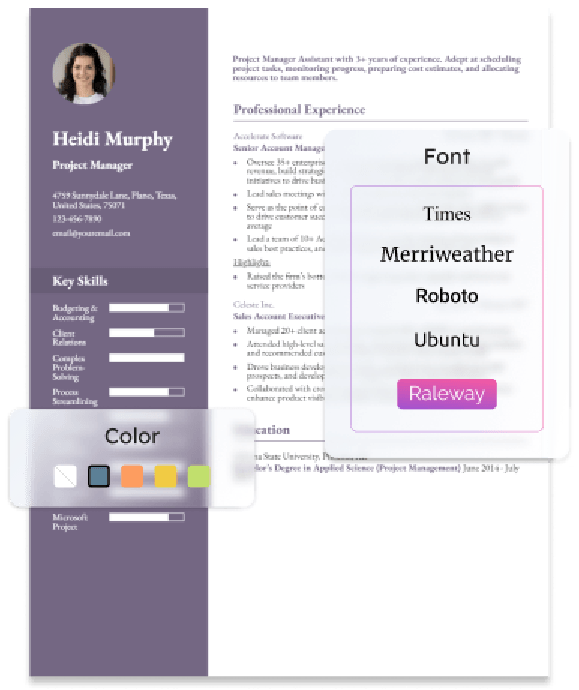When writing your resume for legal jobs, use each section to show you have strong knowledge in your specialized field. Hiring managers want to know where you gained important skills such as legal research, public speaking, or settlement negotiations. They also want to see how you’ve applied those skills to help clients, attorneys, and other colleagues. The tips and examples below will help you draft a powerful resume that gets you interviews for your next legal job.
“Law and legal resumes should reflect research and analysis abilities, writing strength, and attention to detail. Tailor your resume to the practice area you’re pursuing.”
Most Popular Law and Legal Resumes
Law And Legal Resume Example
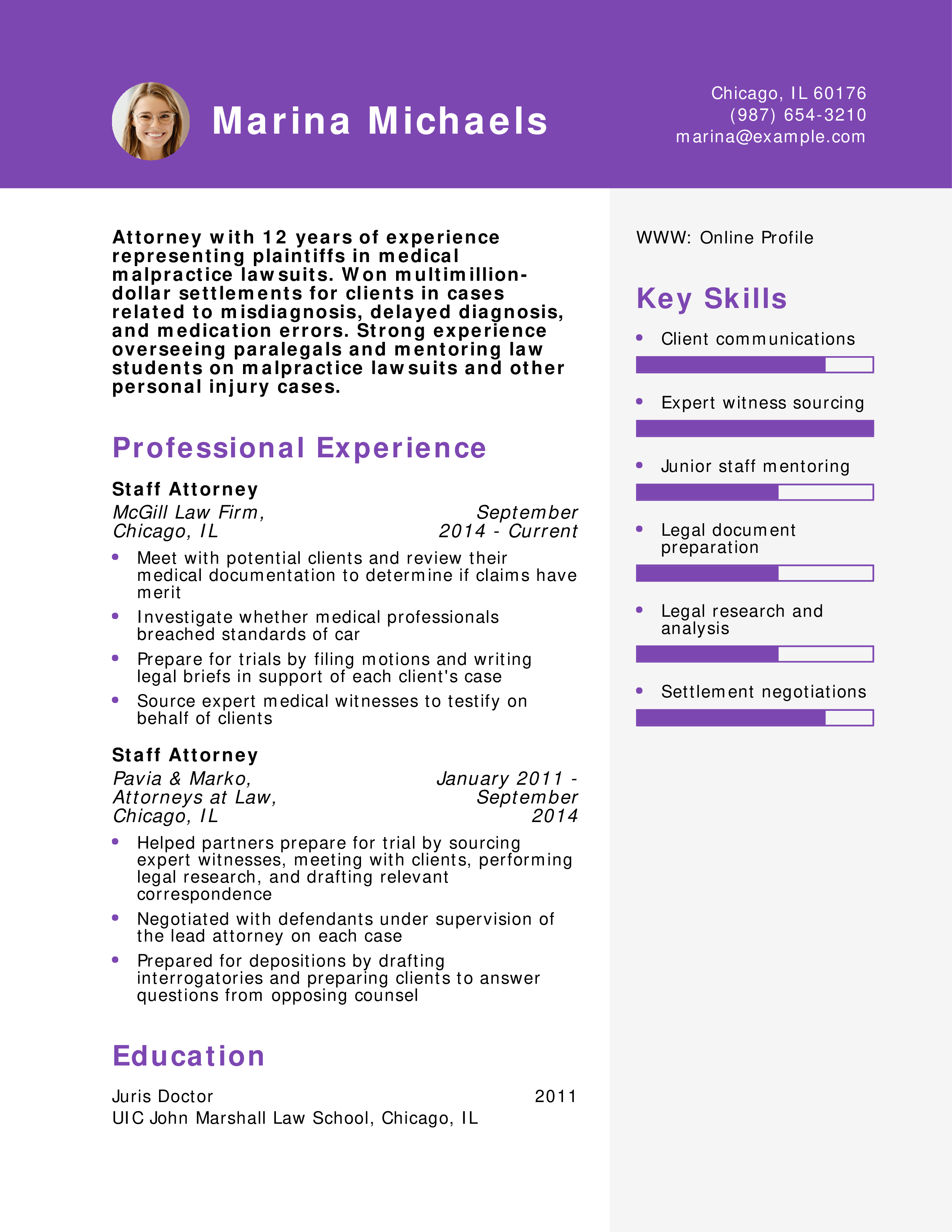
Why This Medical Malpractice Attorney Resume Works
This resume showcases the candidate’s deep expertise in medical malpractice litigation, including winning multimillion-dollar settlements and sourcing expert witnesses. The measurable outcomes and leadership roles enhance credibility. Explore more on writing attorney resumes here.
Family Law Paralegal Resume
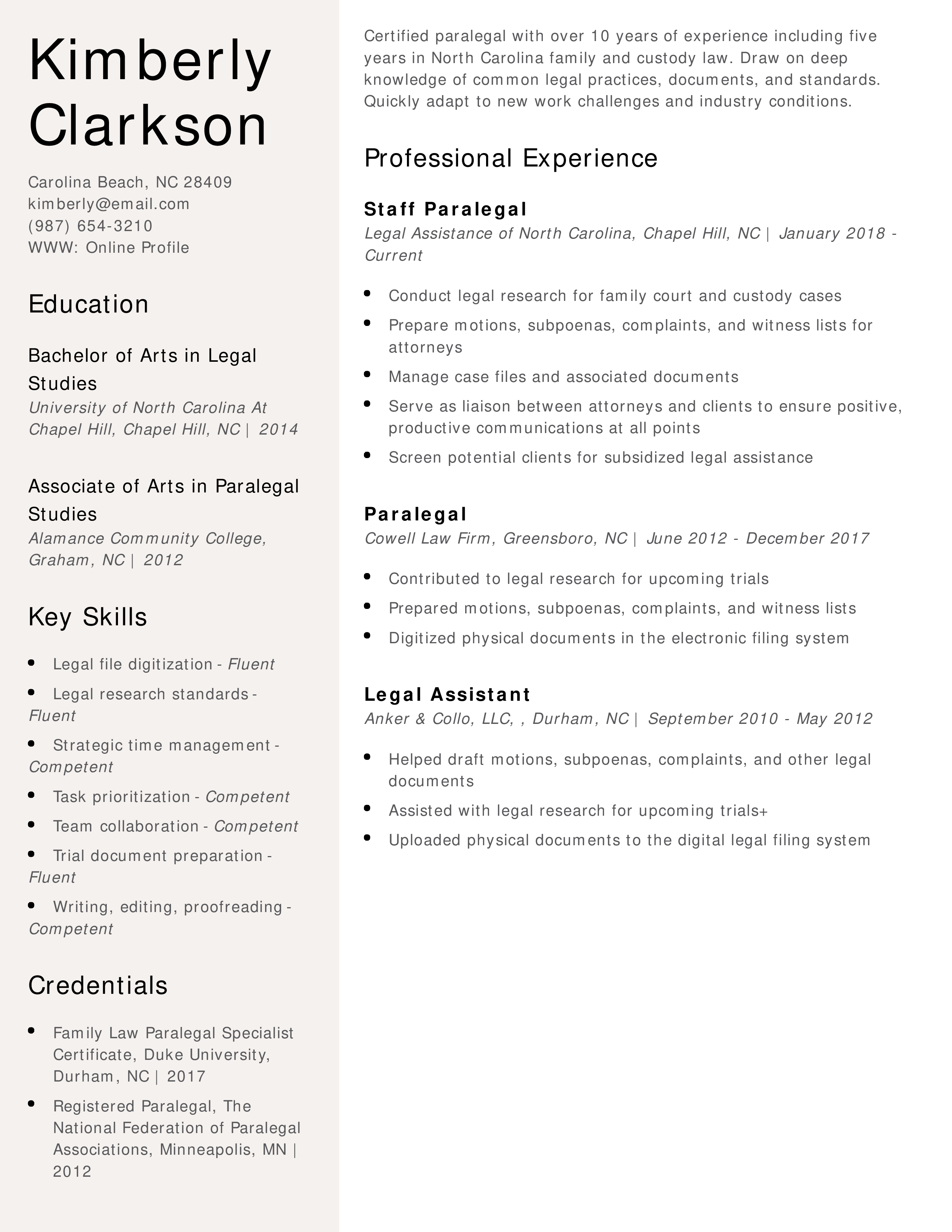
Why This Family Law Paralegal Resume Works
This resume highlights the candidate’s certifications and specialized experience in family law. It also demonstrates their ability to support attorneys and clients through strong organizational and legal research skills. Learn how to showcase certifications on a resume here.
Corporate Attorney Resume
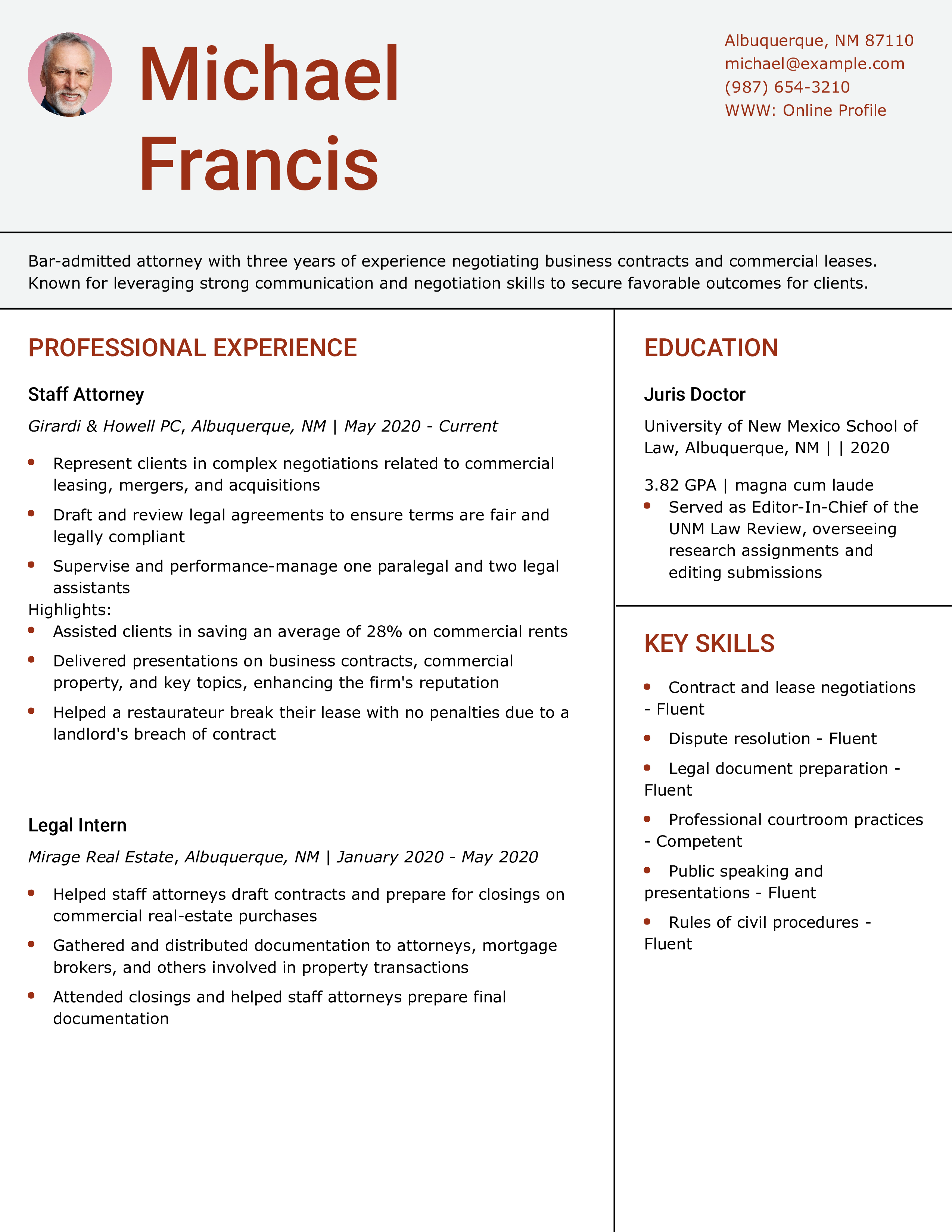
Why This Corporate Attorney Resume Works
This resume demonstrates the candidate’s expertise in commercial leasing and contract negotiation. The measurable results, such as helping clients save on rents, make the resume impactful. Learn how to write an attorney resume here.
Civil Litigation Attorney Resume
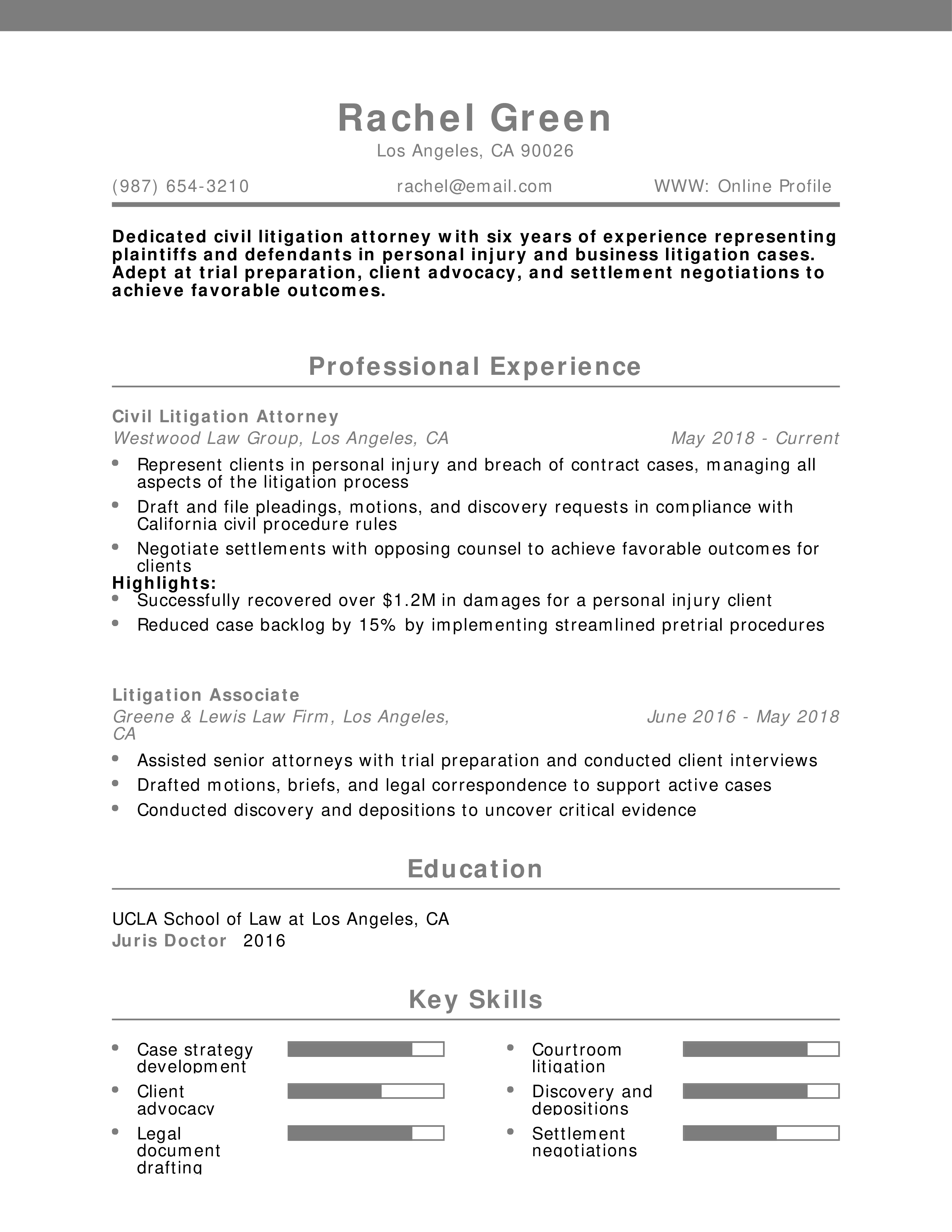
Why This Civil Litigation Attorney Resume Works
This resume effectively highlights the candidate’s expertise in managing the full litigation process, from pleadings to courtroom advocacy. The measurable success in recovering damages and reducing case backlogs demonstrates the candidate’s impact. Learn more about crafting a litigation attorney resume here.
Family Law Attorney Resume
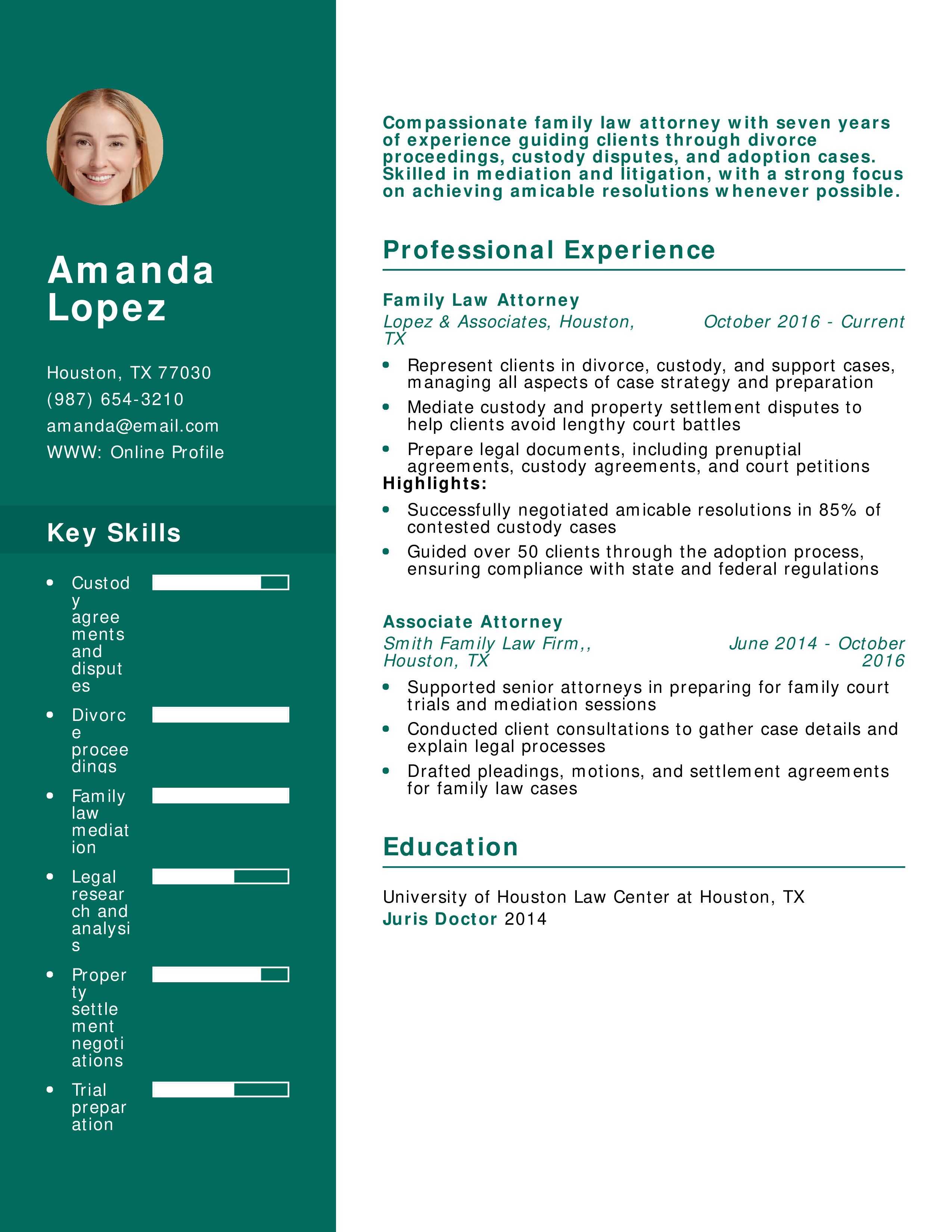
Why This Family Law Attorney Resume Works
This resume demonstrates the candidate’s ability to handle complex and sensitive family law cases while achieving favorable outcomes for clients. The focus on mediation and measurable success rates in custody cases enhances credibility. Explore family law attorney resume tips here.
Real Estate Attorney Resume
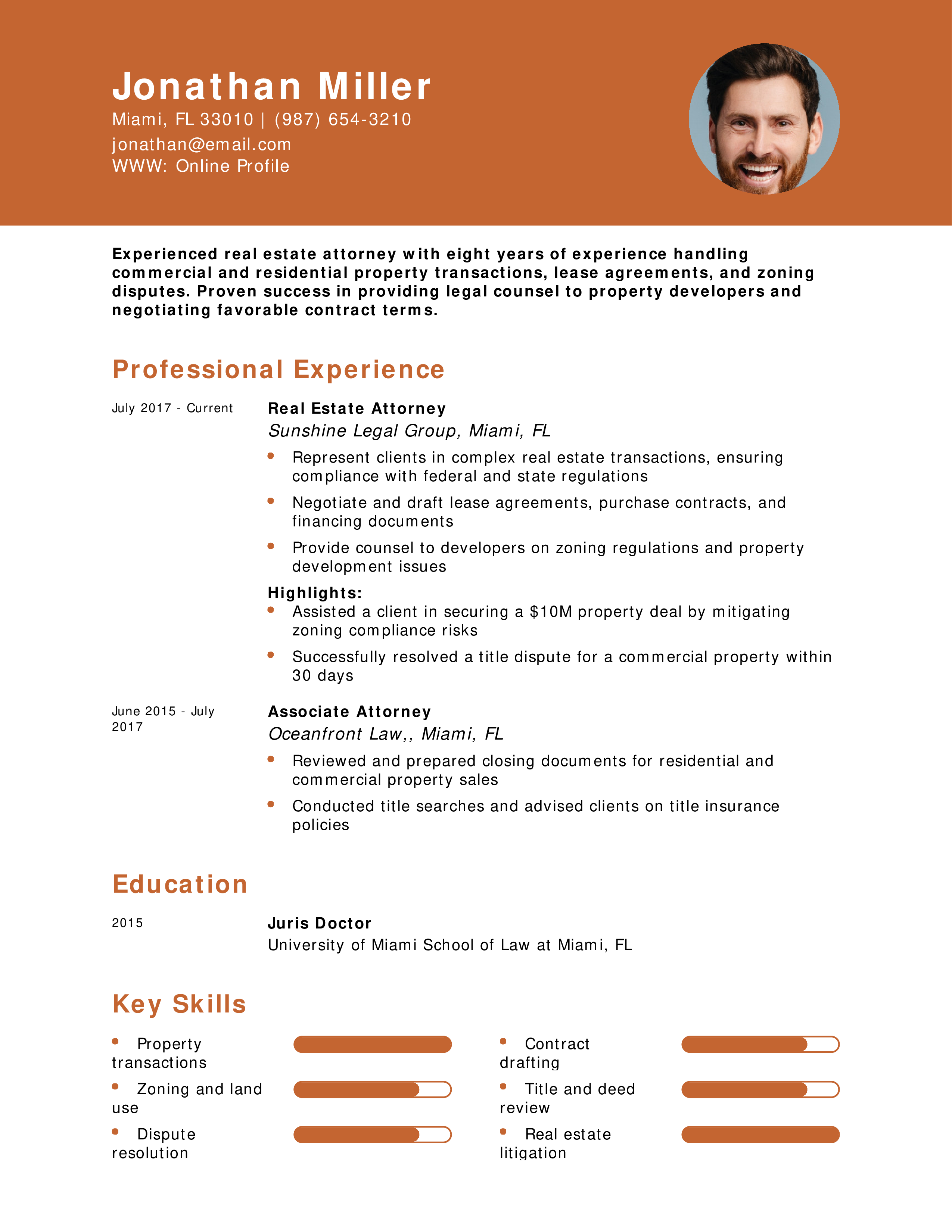
Why This Real Estate Attorney Resume Works
This resume effectively highlights the candidate’s expertise in real estate law, including significant accomplishments such as securing multimillion-dollar property deals and resolving title disputes. Learn more about real estate attorney resumes here.
Contract Attorney Resume
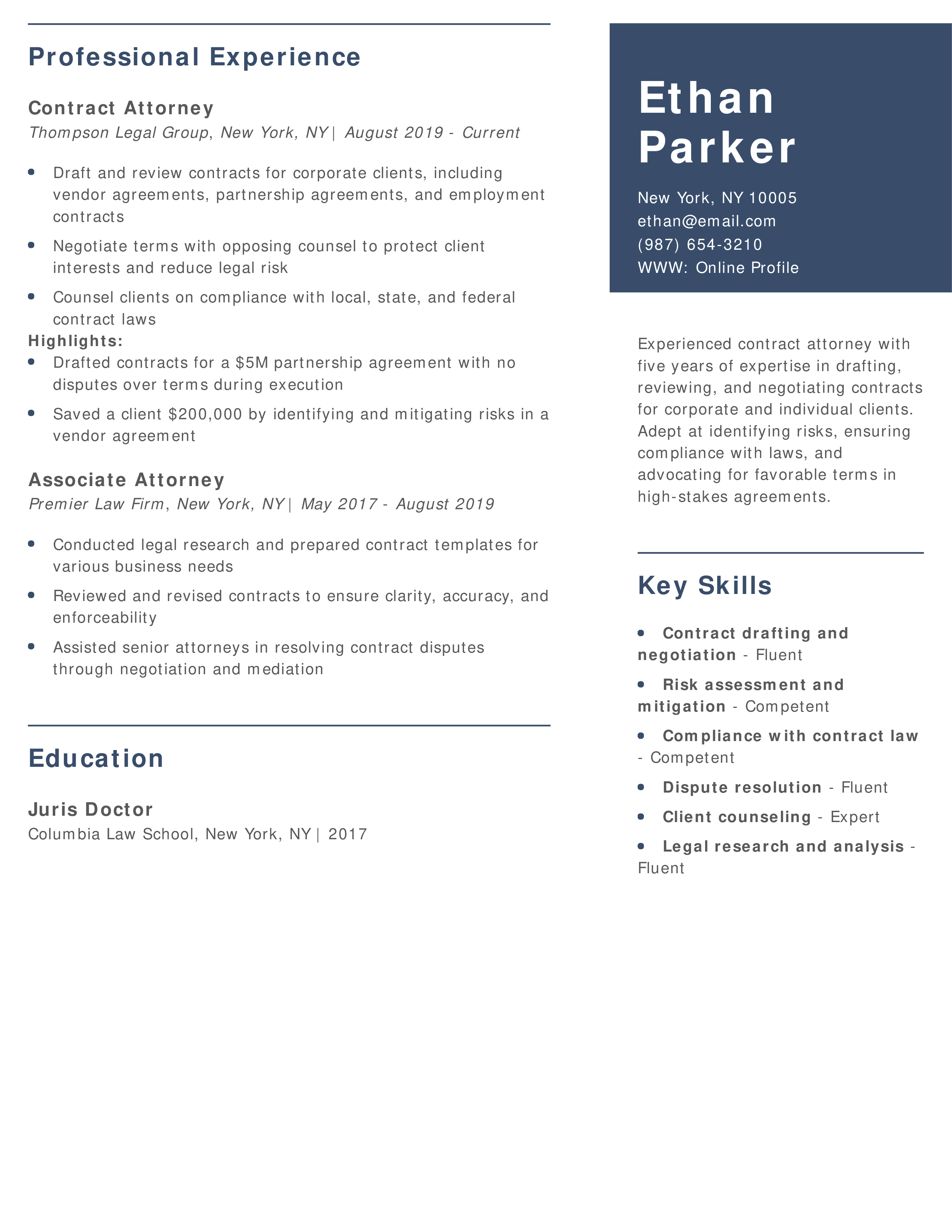
Why This Contract Attorney Resume Works
This resume showcases the candidate’s expertise in drafting and negotiating contracts, as well as their ability to mitigate risks and save clients money. The measurable accomplishments make it compelling. Learn more about contract attorney resumes here.
Trademark Attorney Resume
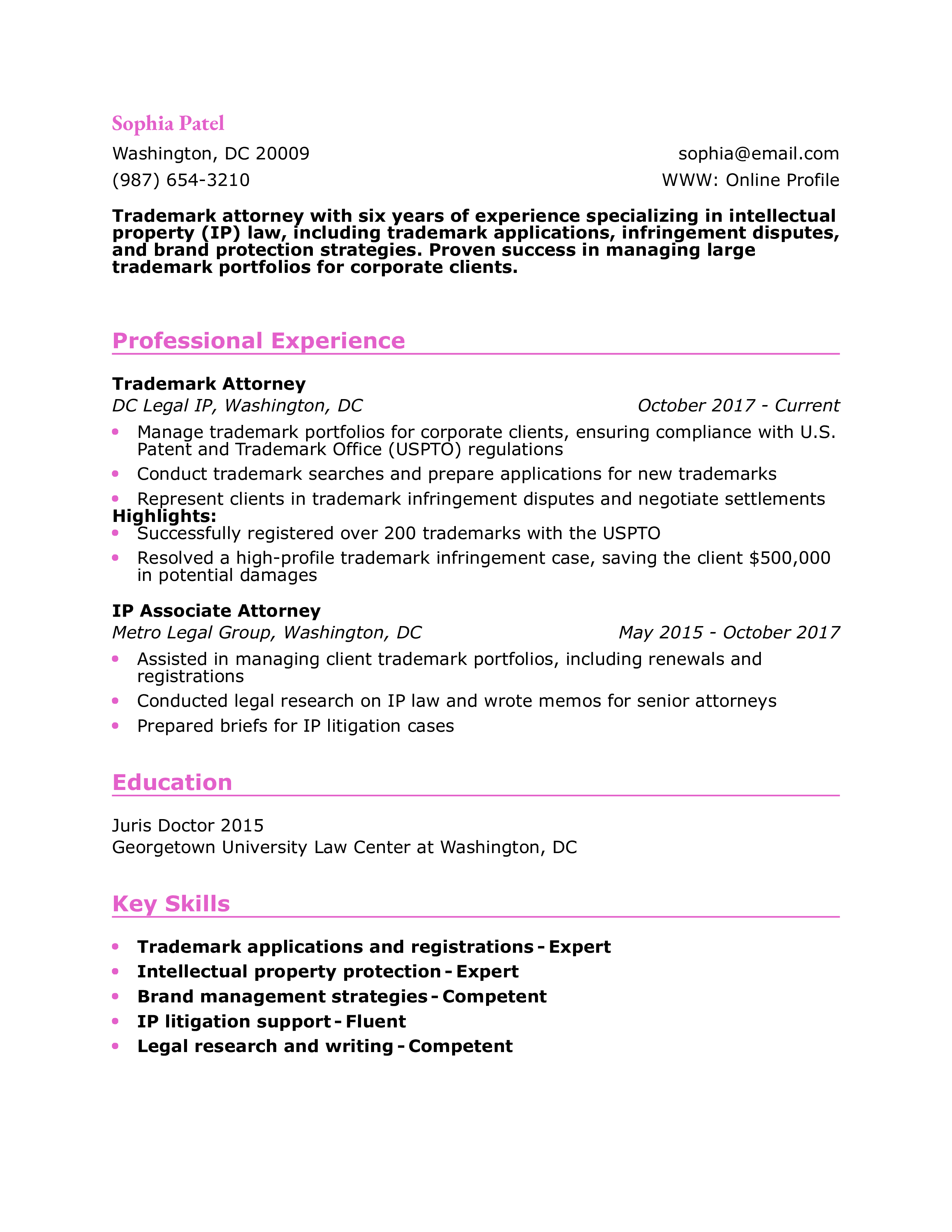
Why This Trademark Attorney Resume Works
This resume emphasizes the candidate’s specialized expertise in trademark law and measurable success managing portfolios and resolving disputes. It clearly demonstrates the ability to add value to corporate clients. Learn more about IP attorney resumes here.
Litigation Attorney Resume
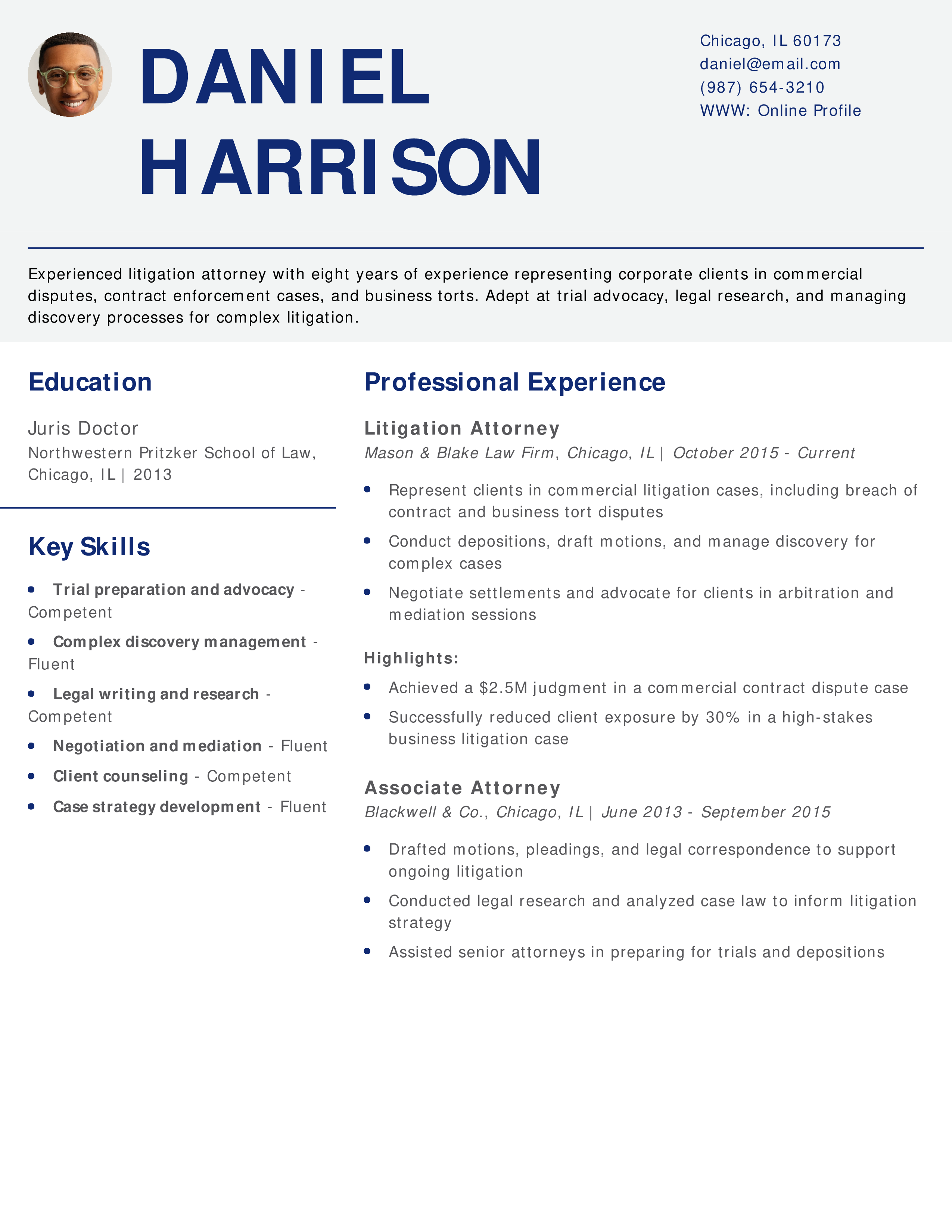
Why This Litigation Attorney Resume Works
This resume highlights the candidate’s extensive experience in commercial litigation, with a strong focus on measurable outcomes such as achieving a $2.5M judgment. Their ability to handle high-stakes cases and manage complex discovery processes sets them apart. Learn more about crafting litigation attorney resumes here.
Senior Attorney Resume
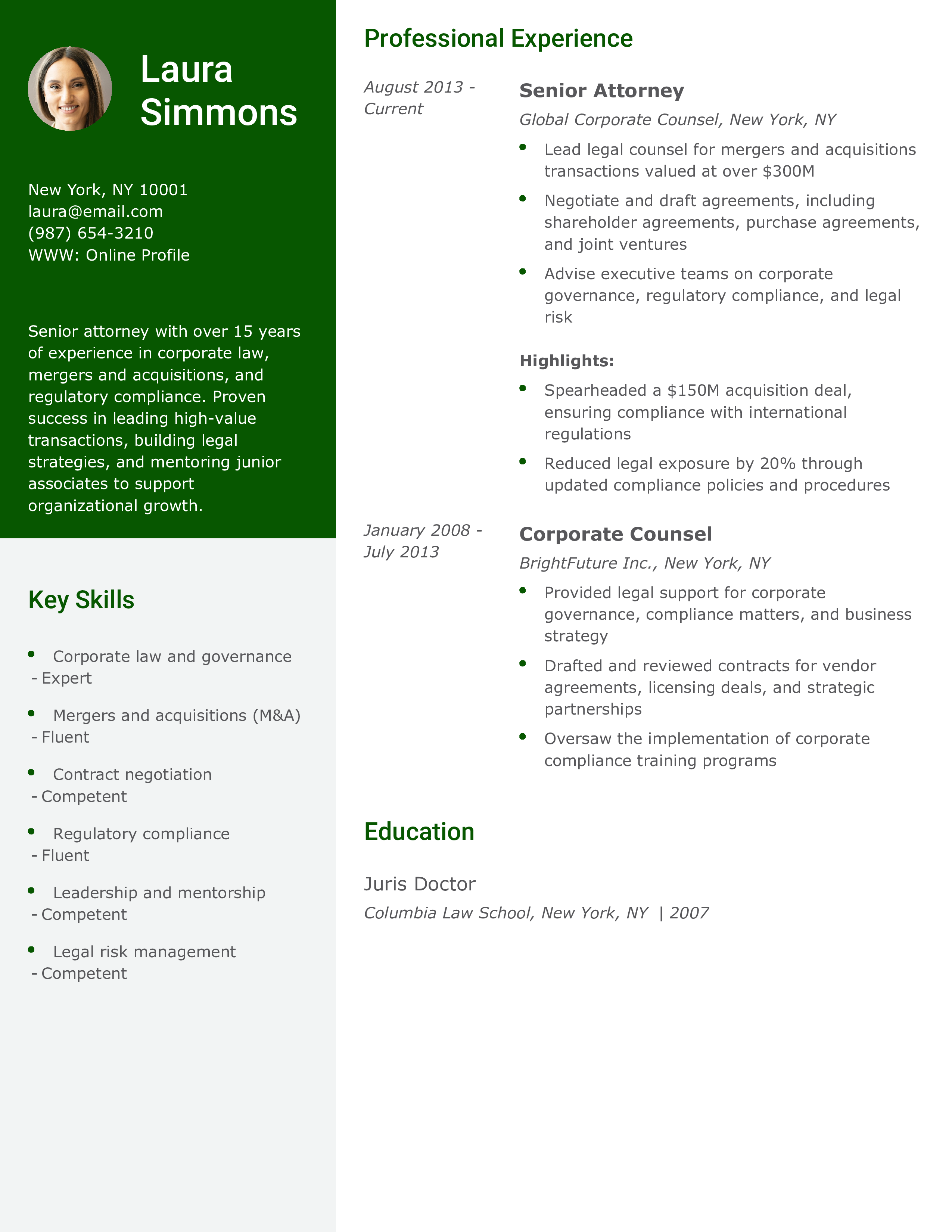
Why This Senior Attorney Resume Works
This resume demonstrates extensive leadership in corporate law, with clear examples of high-value transactions and compliance initiatives. The focus on measurable results, such as reducing legal exposure, highlights the candidate’s impact. Learn more about senior-level attorney resumes here.
Transactional Attorney Resume
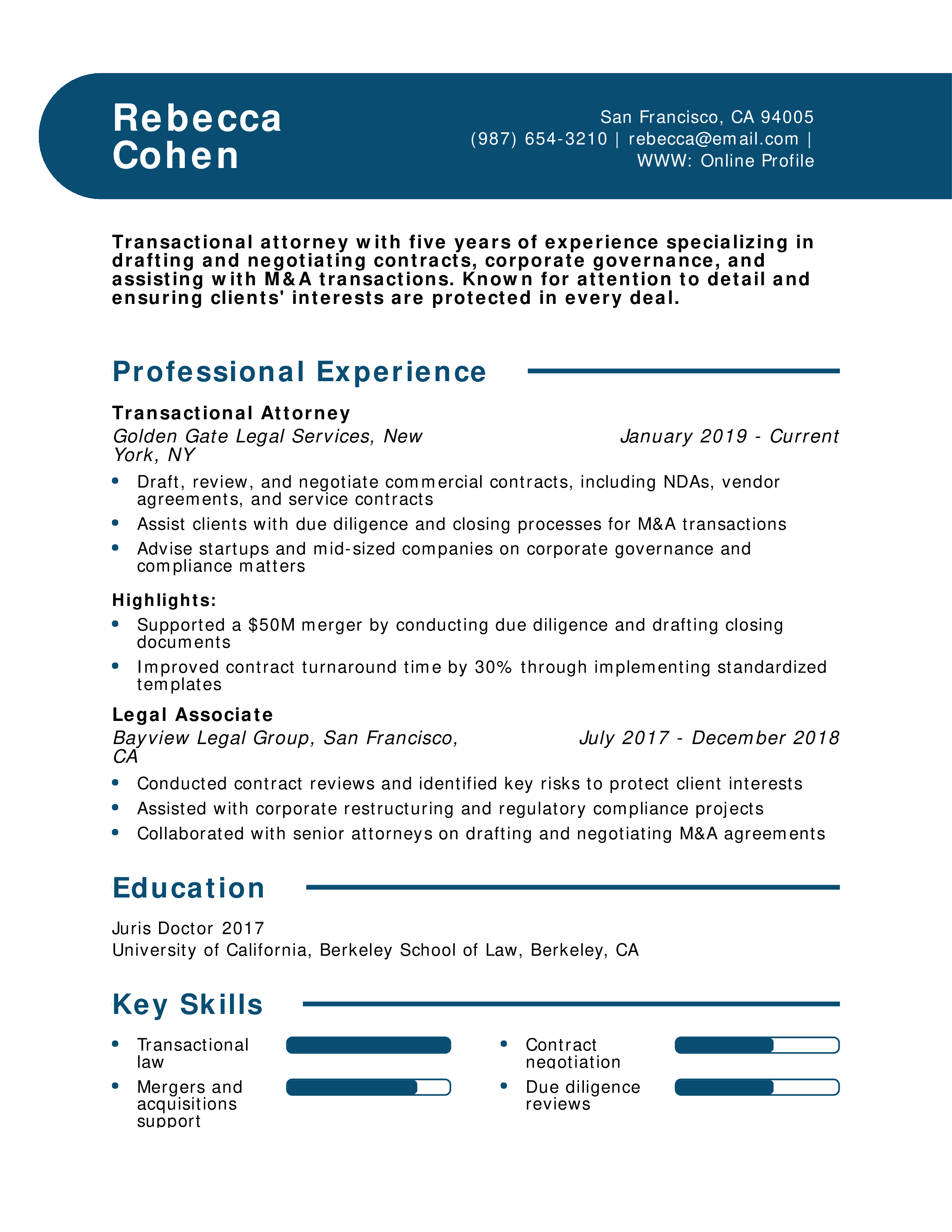
Why This Transactional Attorney Resume Works
This resume effectively highlights the candidate’s expertise in transactional law, with measurable achievements like improving contract turnaround time. The detailed examples of M&A and governance experience add depth to the candidate’s qualifications. Explore transactional attorney resume tips here.
Document Review Attorney Resume
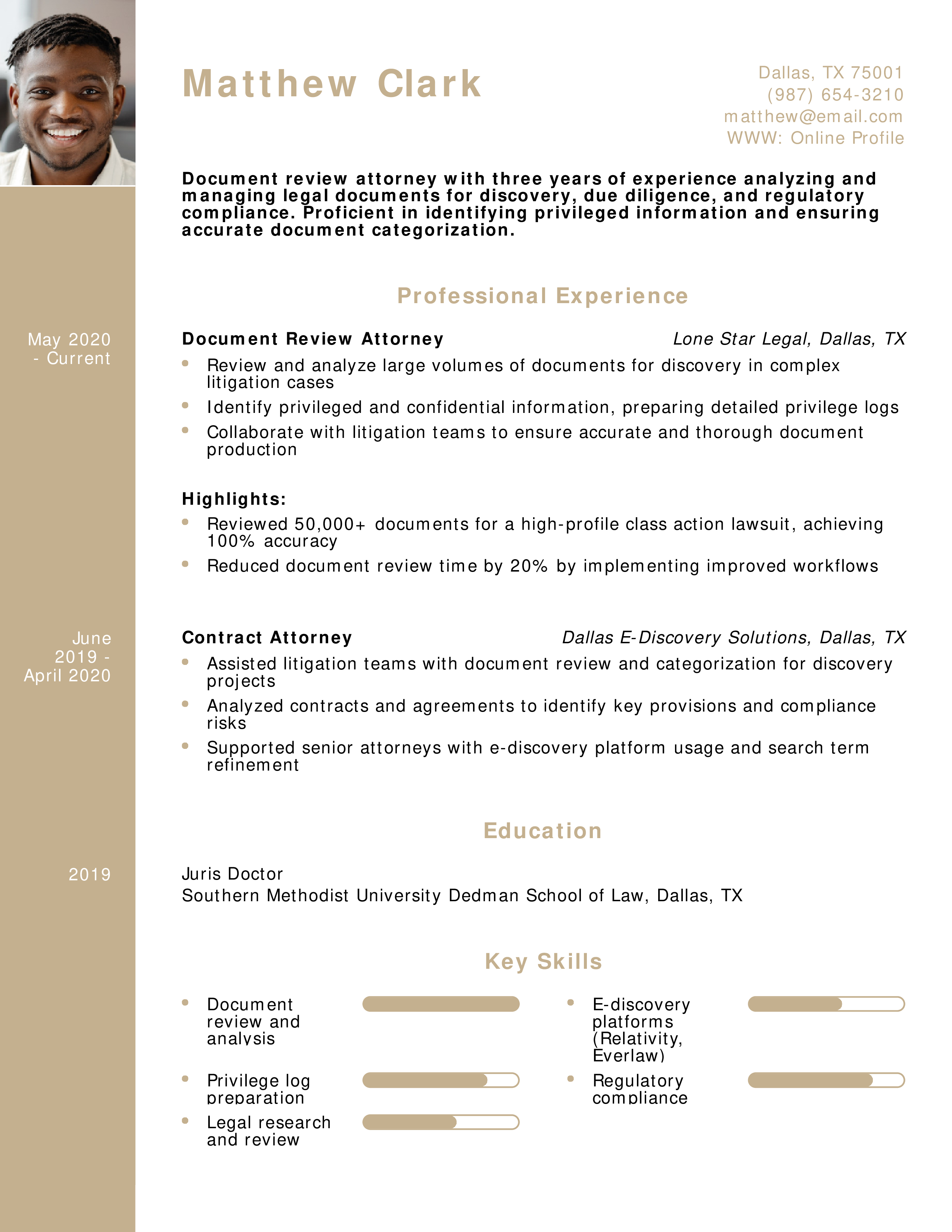
Why This Document Review Attorney Resume Works
This resume highlights the candidate’s expertise in e-discovery and document review, with quantifiable achievements such as reviewing 50,000+ documents with 100% accuracy. The focus on efficiency and compliance strengthens the resume’s appeal. Learn more about document review attorney resumes here.
Entry-Level Attorney Resume
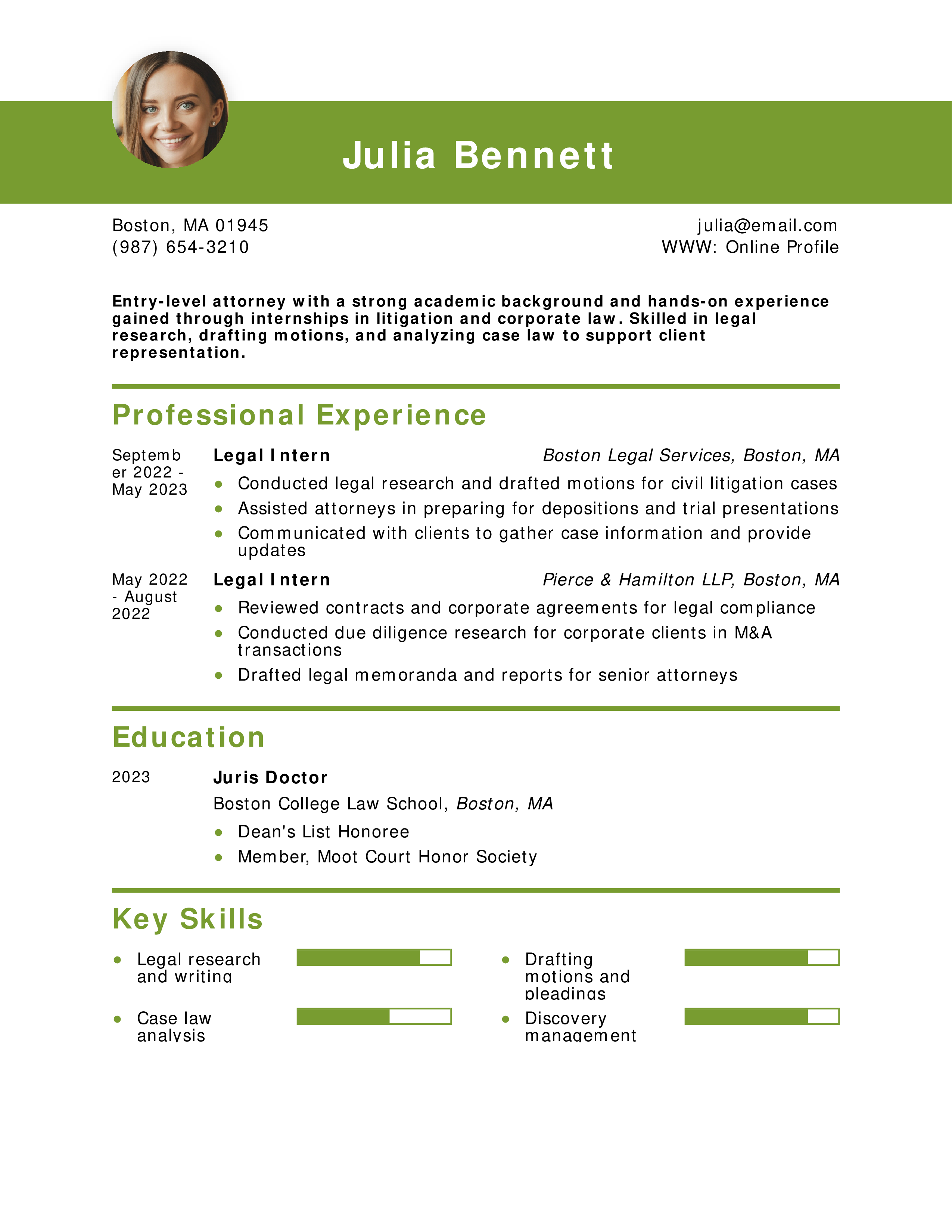
Why This Entry-Level Attorney Resume Works
This resume emphasizes the candidate’s academic achievements and internship experiences, demonstrating readiness for an entry-level attorney role. The focus on specific tasks, like drafting motions and conducting research, showcases relevant skills. Explore entry-level attorney resume tips here.
Immigration Attorney Resume
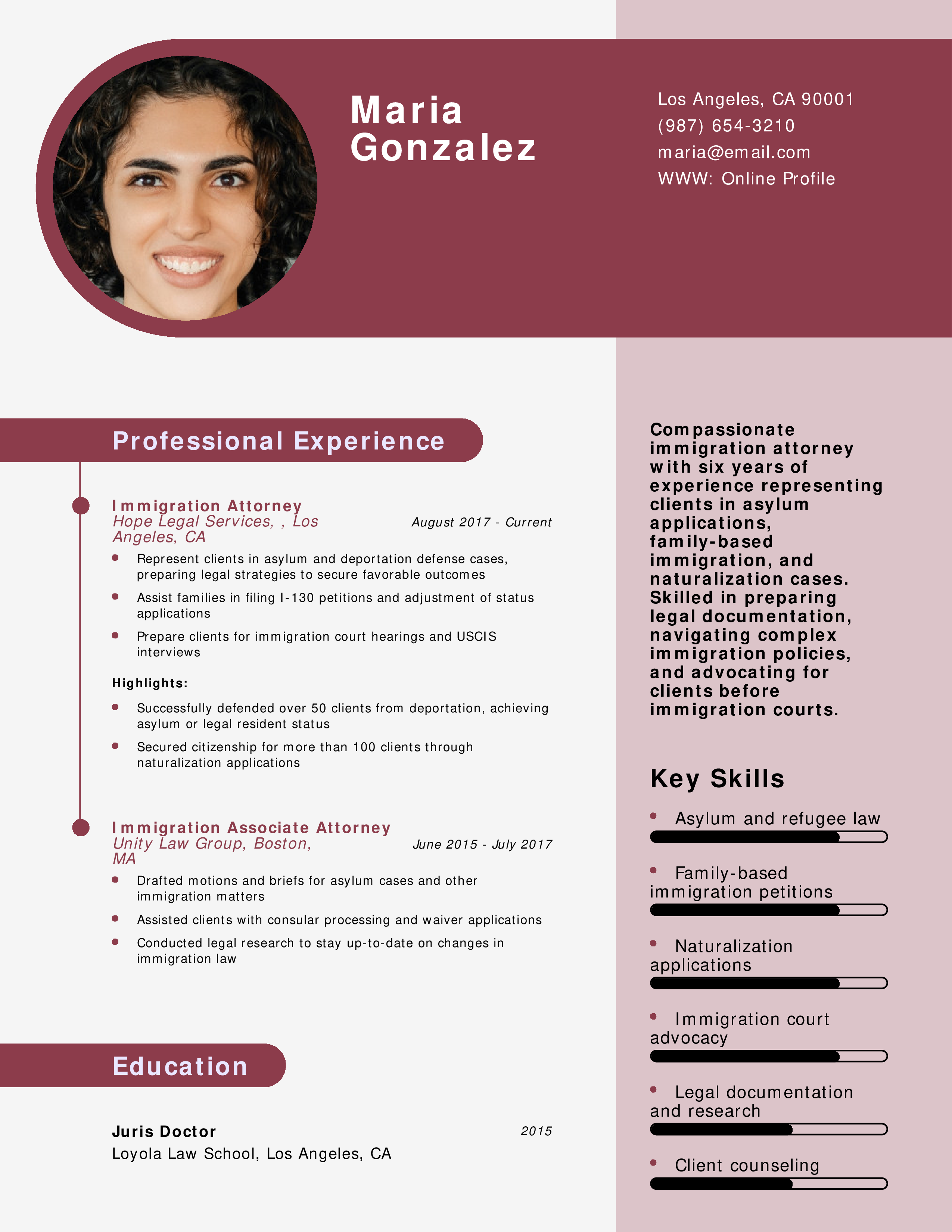
Why This Immigration Attorney Resume Works
This resume highlights the candidate’s extensive experience in both family-based immigration and asylum law, emphasizing their successful client outcomes. The measurable achievements in securing citizenship and asylum demonstrate their expertise and dedication. Learn more about writing immigration attorney resumes here.
Trademark and Copyright Attorney Resume
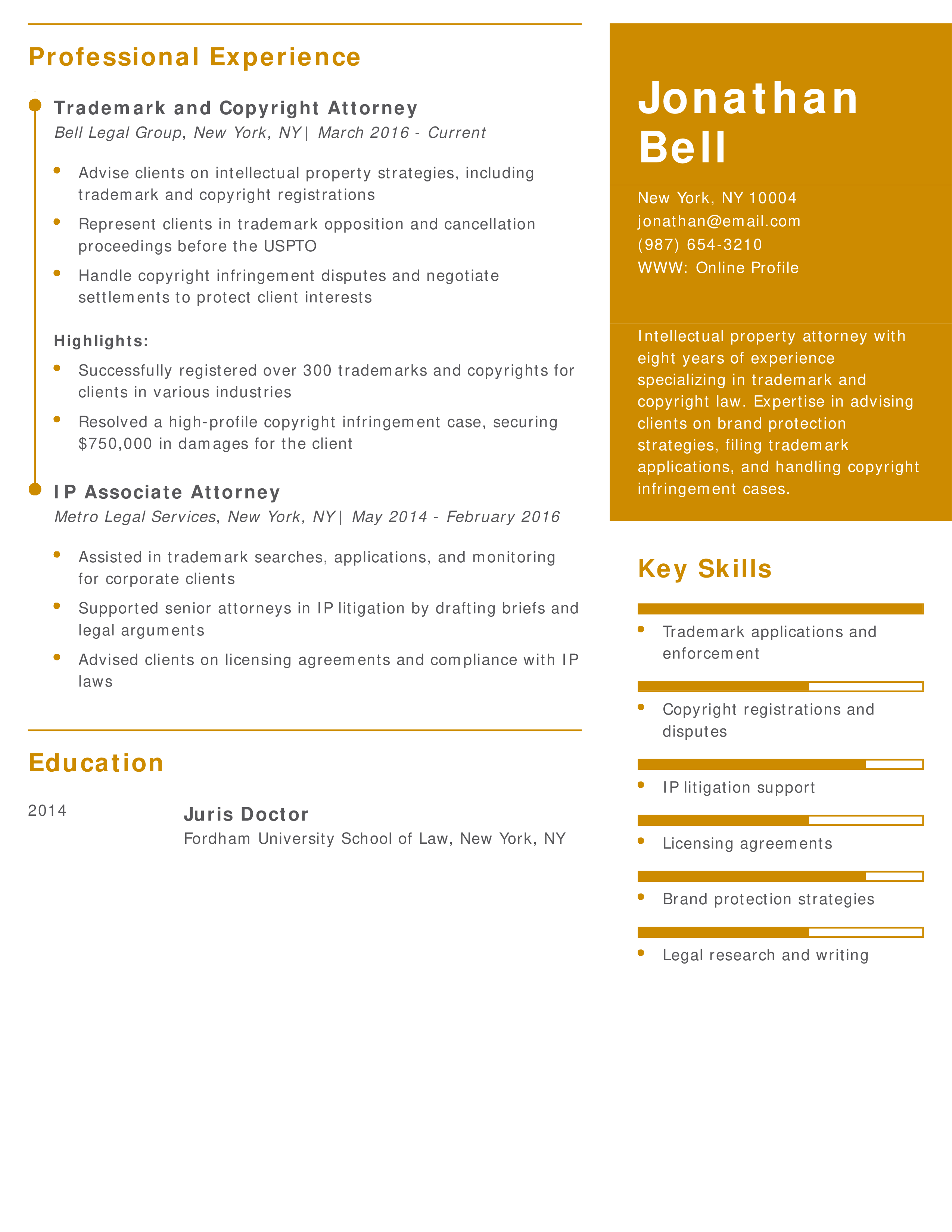
Why This Trademark and Copyright Attorney Resume Works
This resume highlights the candidate’s specialized expertise in intellectual property law, with strong results like securing damages in infringement cases and registering hundreds of trademarks. The focus on brand protection strategies adds value. Learn more about IP attorney resumes here.
Criminal Defense Attorney Resume
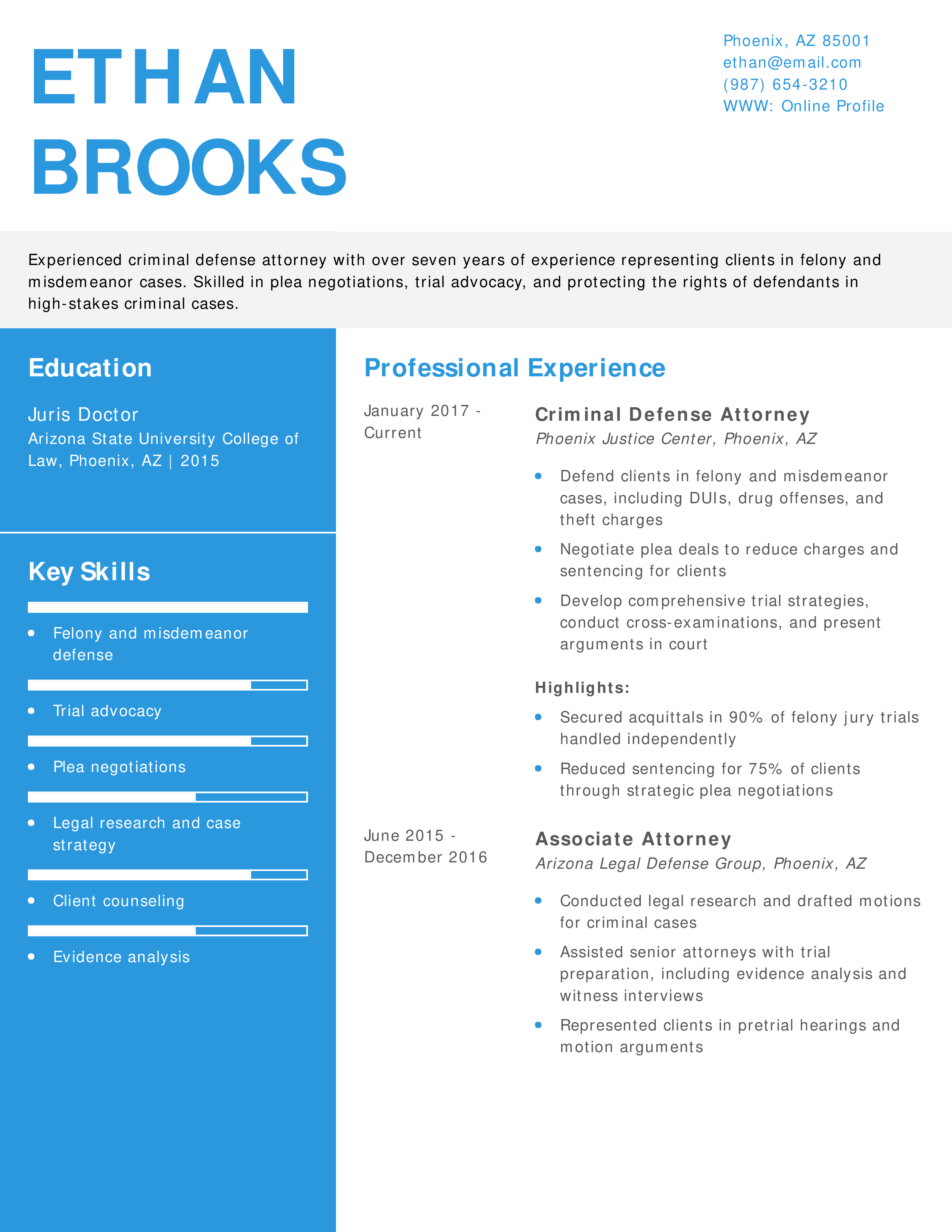
Why This Criminal Defense Attorney Resume Works
This resume emphasizes the candidate’s extensive trial experience and success in defending clients in high-stakes criminal cases. The measurable results, such as acquittal rates and reduced sentences, showcase their effectiveness. Learn more about criminal defense resumes here.
Family Immigration Attorney Resume
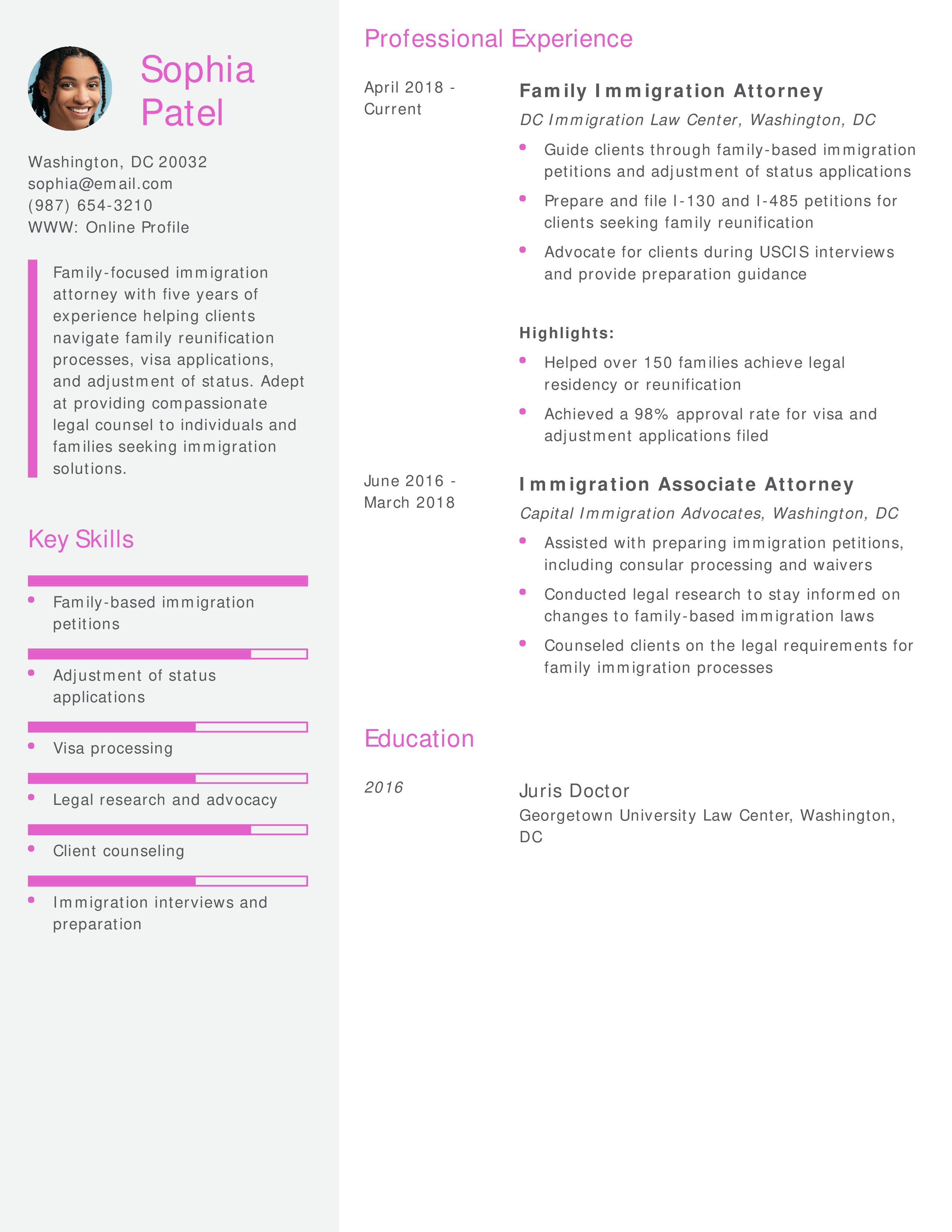
Why This Family Immigration Attorney Resume Works
This resume highlights the candidate’s specialization in family-based immigration cases and their high success rate in securing legal residency for clients. The focus on compassionate counseling and measurable client outcomes sets this resume apart. Learn more about immigration attorney resumes here.
Healthcare Attorney Resume
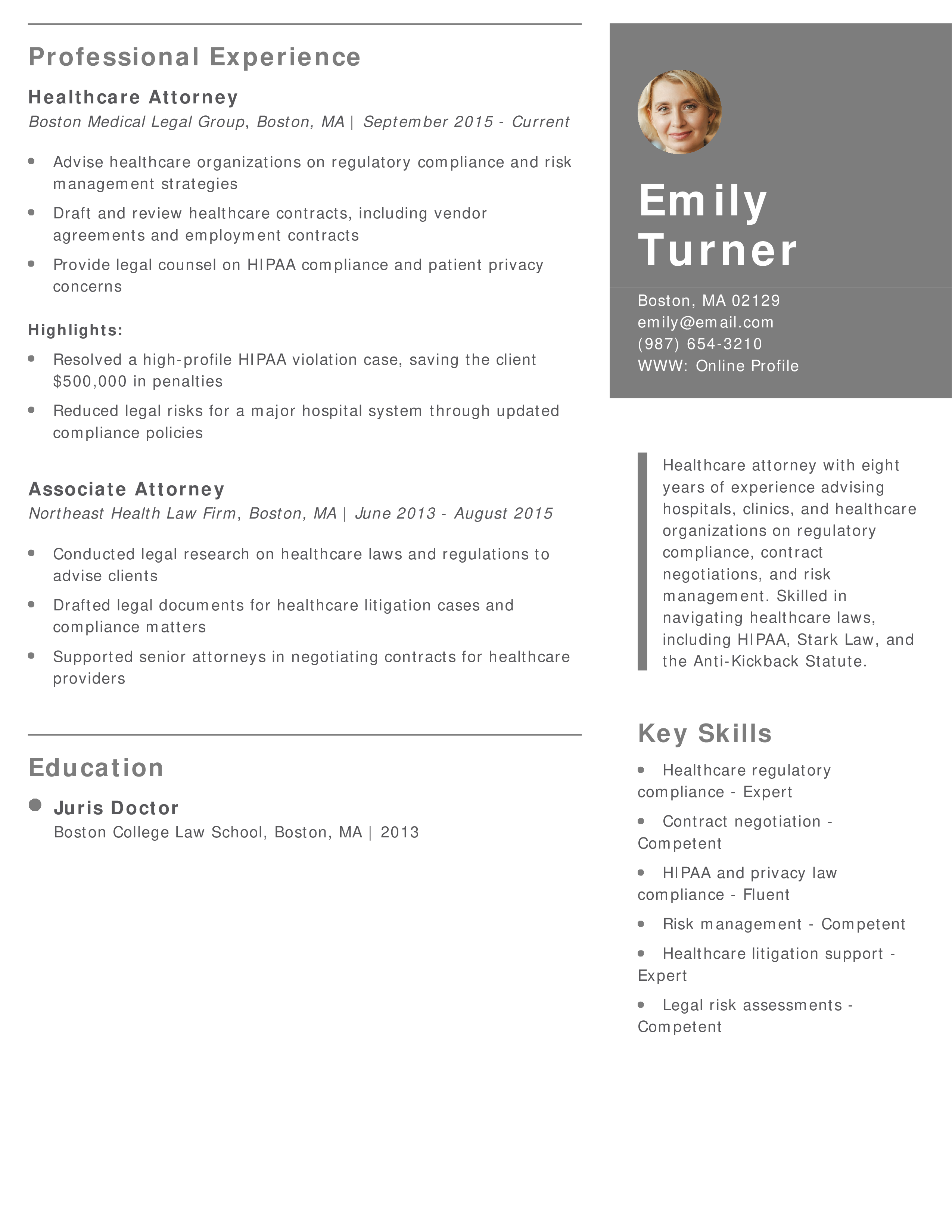
Why This Healthcare Attorney Resume Works
This resume emphasizes the candidate’s in-depth knowledge of healthcare laws and their measurable impact on resolving regulatory and compliance issues. Their success in managing HIPAA and Stark Law concerns demonstrates expertise in a niche area. Learn more about healthcare attorney resumes here.
Entertainment Attorney Resume
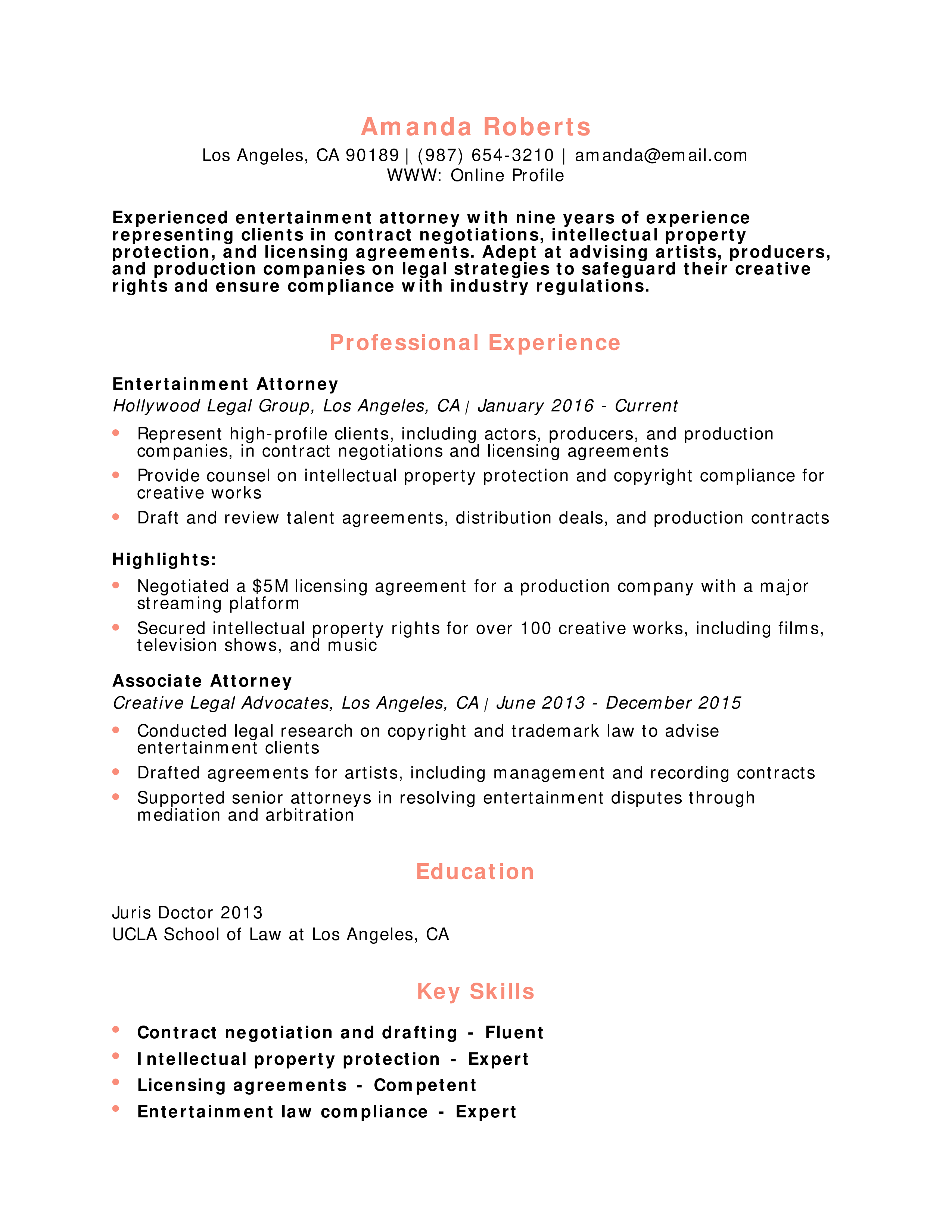
Why This Entertainment Attorney Resume Works
This resume highlights the candidate’s extensive experience in entertainment law, showcasing significant achievements such as negotiating multimillion-dollar deals and protecting intellectual property rights. The focus on measurable results and industry-specific expertise makes it compelling. Learn more about attorney resumes here.
Compliance Attorney Resume
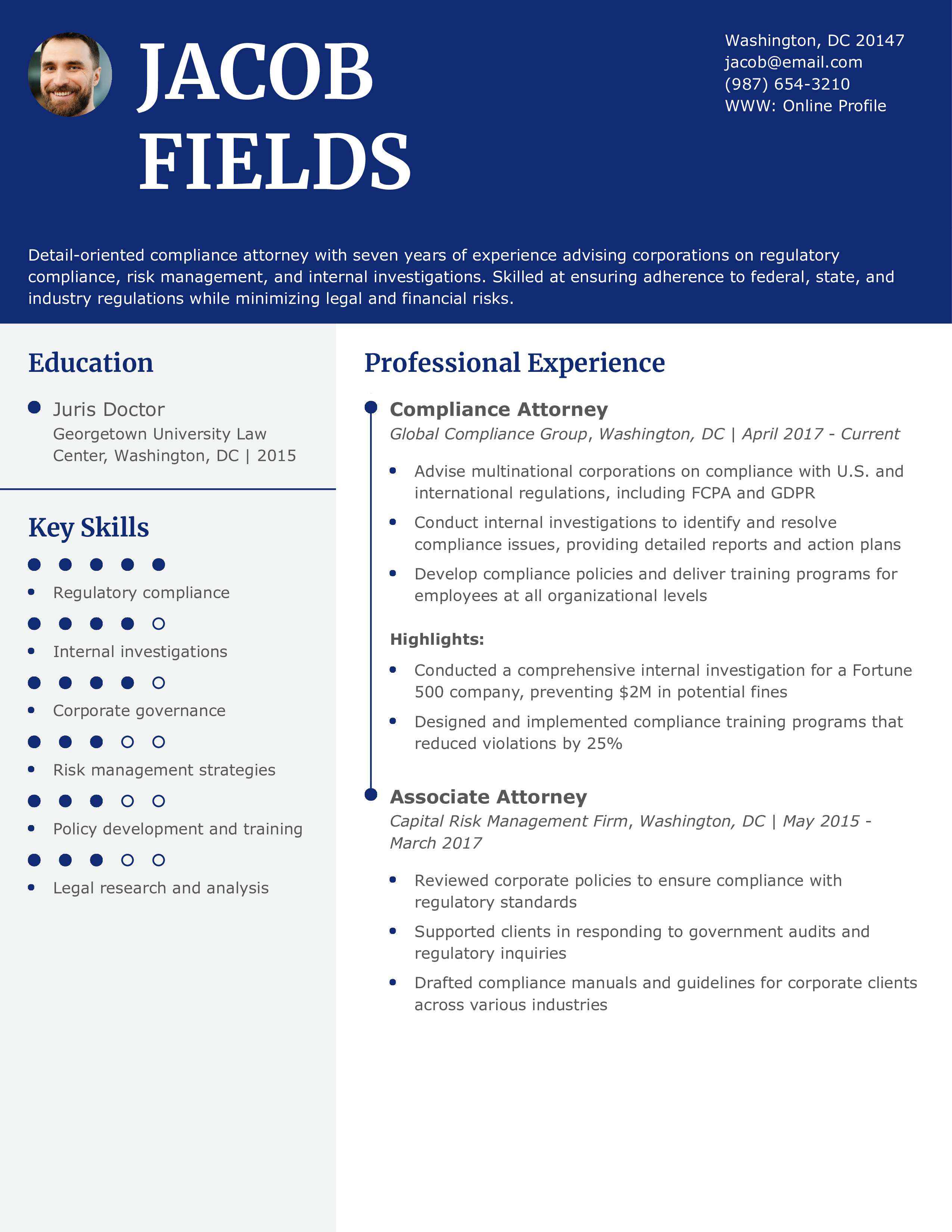
Why This Compliance Attorney Resume Works
This resume effectively demonstrates the candidate’s expertise in corporate compliance, with quantifiable achievements such as preventing fines and reducing violations. The focus on internal investigations and training programs showcases their ability to mitigate risks and add value to organizations. Learn more about compliance attorney resumes here.
Environmental Attorney Resume
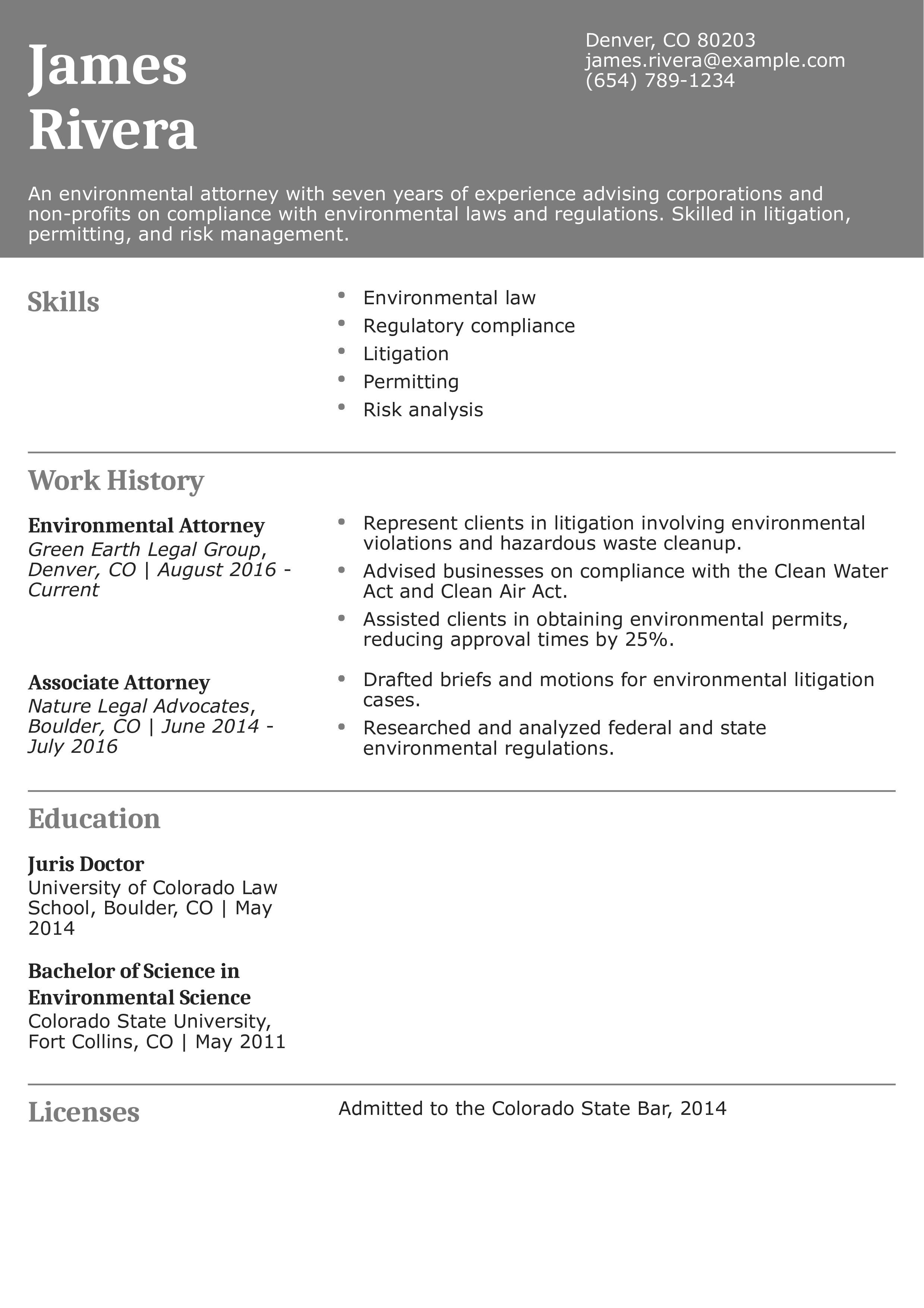
Why This Environmental Lawyer Resume Works
This resume effectively showcases the candidate’s expertise in environmental law, including litigation, compliance, and policy advising. Their diverse experience across government, corporate, and nonprofit sectors adds to their credibility.
Intellectual Property Lawyer Resume
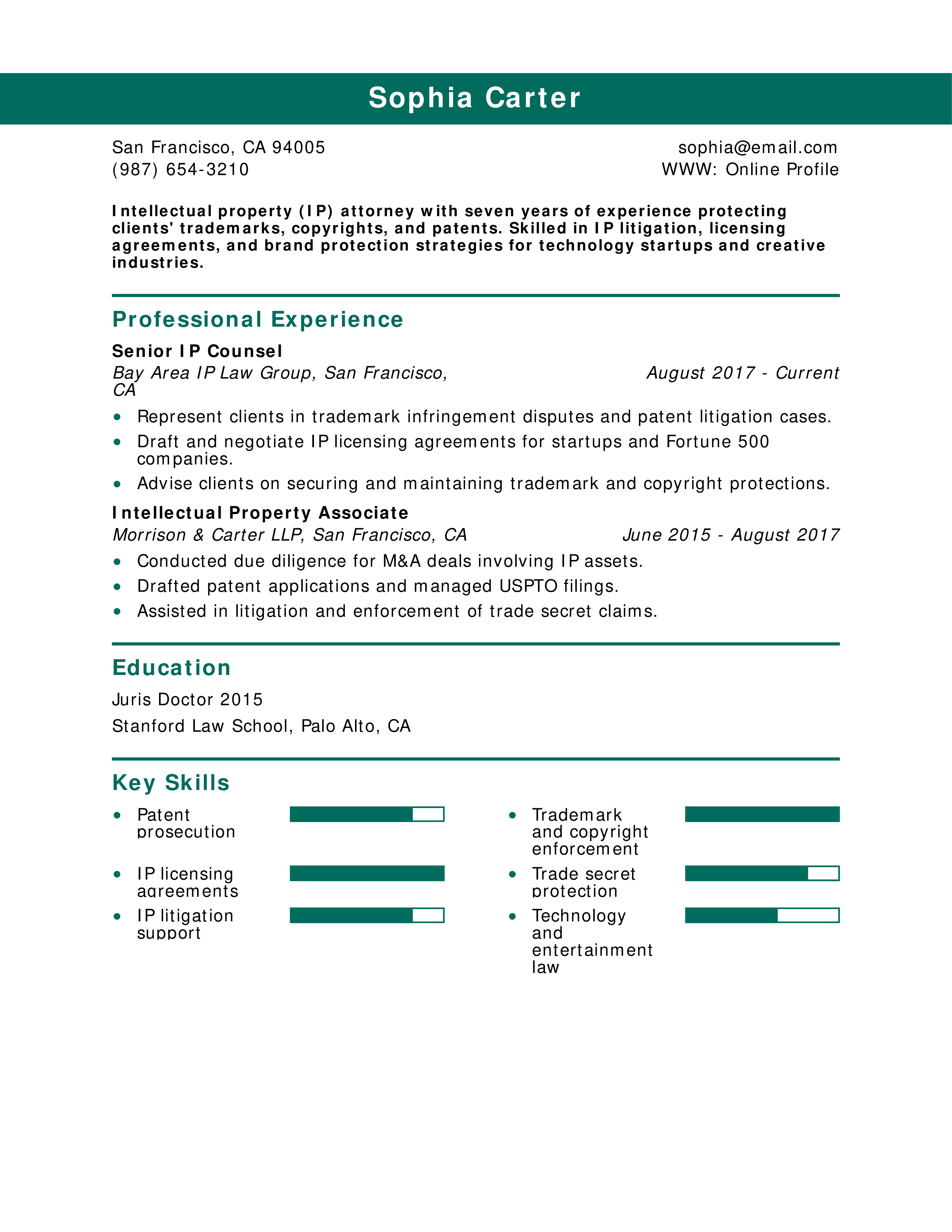
Why This Intellectual Property Lawyer Resume Works
This resume highlights expertise in both litigation and transactional IP law, emphasizing success in securing patents, trademarks, and handling high-stakes disputes in the tech and entertainment industries.
Employment Lawyer Resume
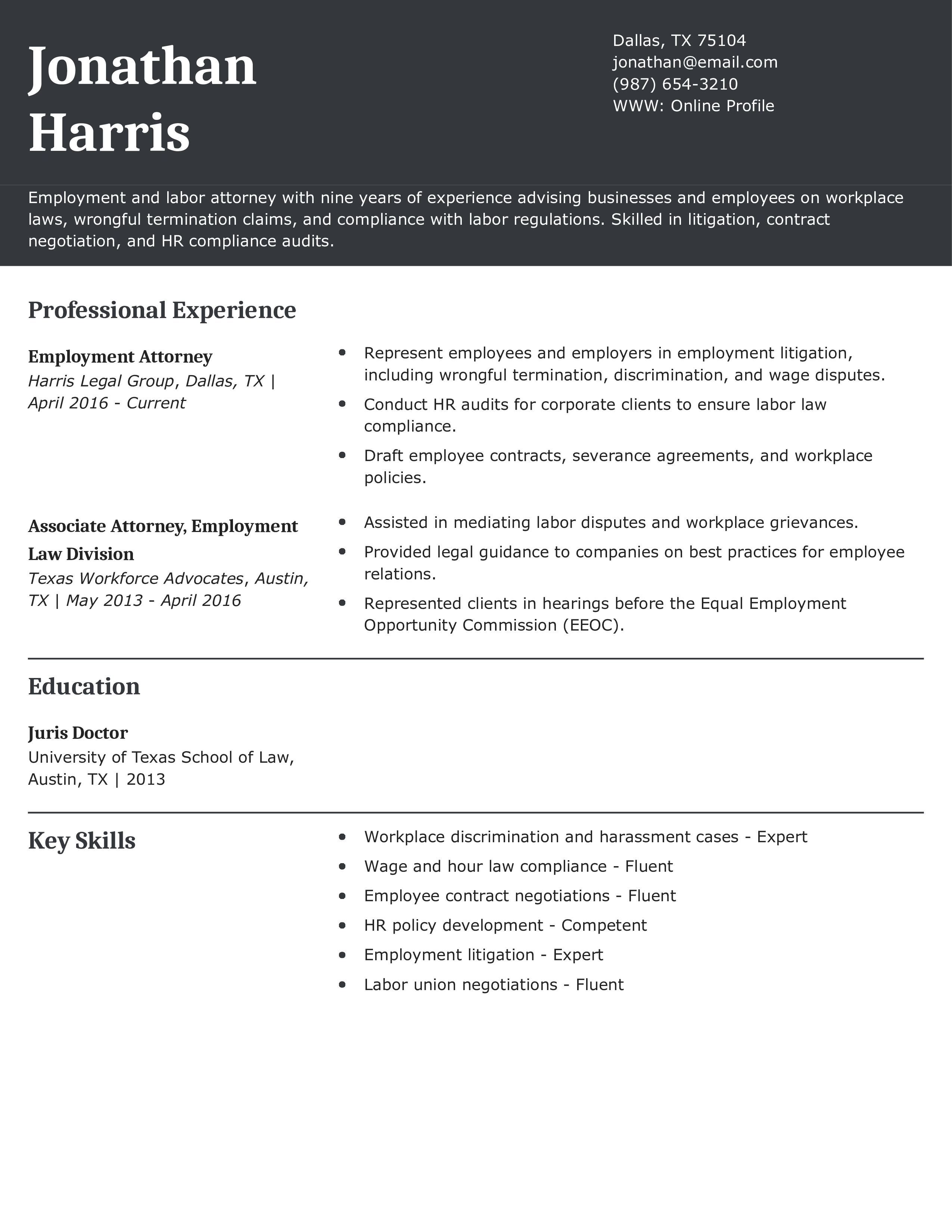
Why This Employment Lawyer Resume Works
This resume highlights extensive experience in employment litigation and HR compliance, making the candidate attractive to both corporations and individuals seeking legal representation.
Bankruptcy Attorney Resume
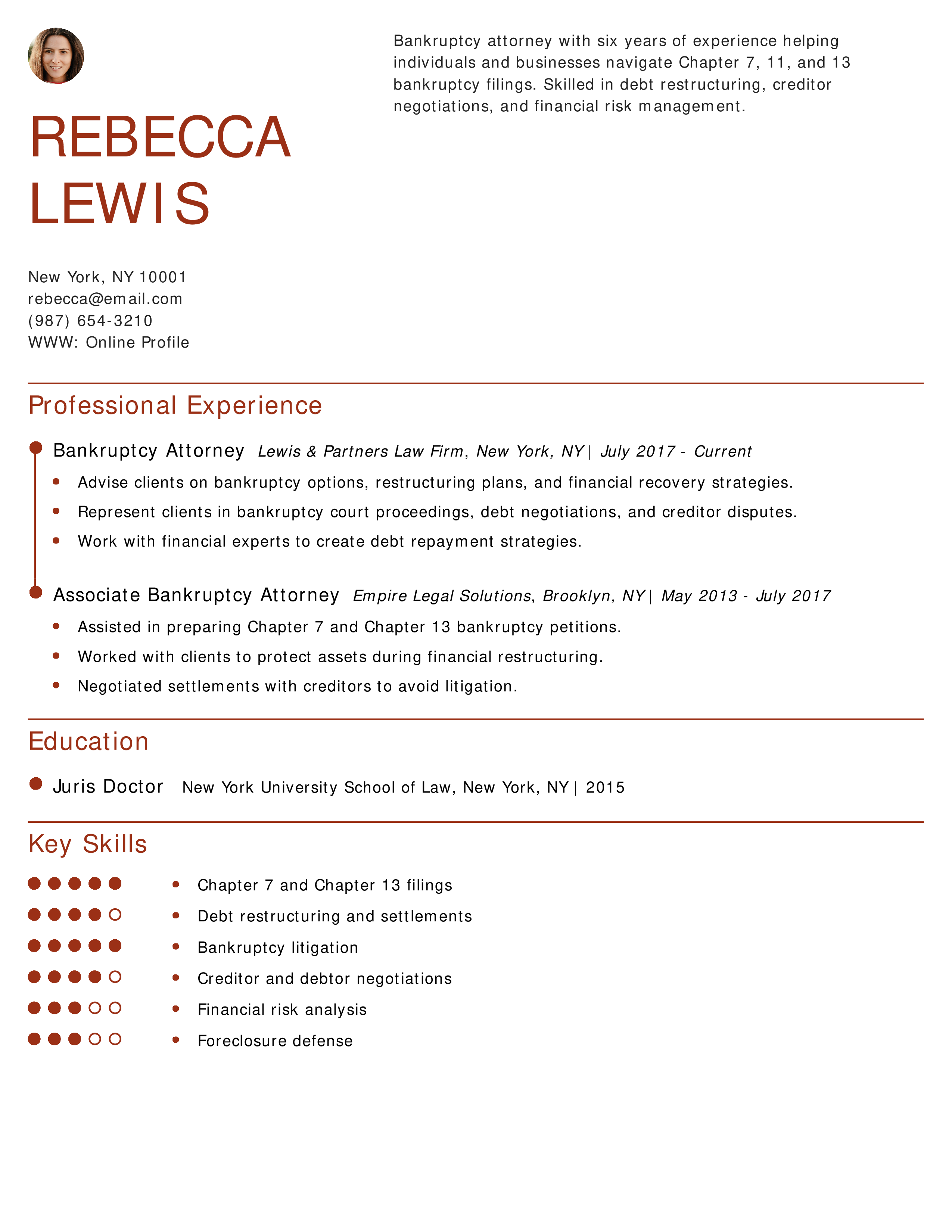
Why This Bankruptcy Attorney Resume Works
This resume clearly demonstrates the candidate’s ability to guide clients through financial distress, including court representation, debt settlements, and strategic restructuring.
White-Collar Criminal Defense Attorney Resume
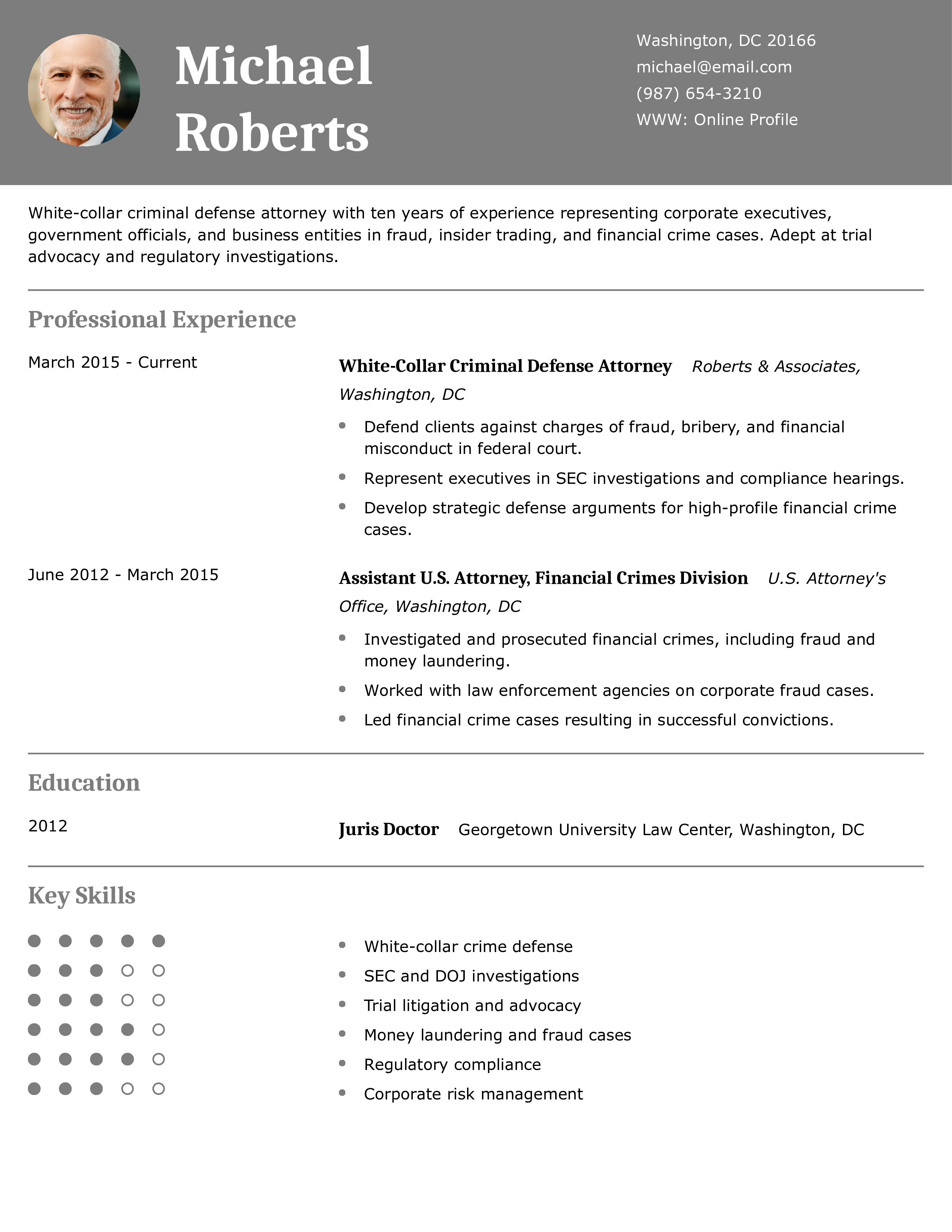
Why This White-Collar Criminal Defense Attorney Resume Works
This resume highlights the candidate’s unique expertise in financial crime defense, emphasizing experience on both prosecution and defense sides to demonstrate well-rounded legal acumen.
Our templates are crafted by professional resume writers to make creating your resume quick, easy, and effective.
- Professional resume template downloads
- Customized cover letter generation
- AI resume writing support
- Career-building resources and advice
Law and Legal Text-Only Resume Templates and Examples
How To Write a Law and Legal Resume
Legal resumes that rely on generic support language hide your true work. Clarify whether you drafted, negotiated, or researched. It helps firms see your level of responsibility.
1. Write a dynamic profile summarizing your law and legal qualifications
Brainstorm the top sources of your law knowledge, then identify the ones most relevant to your target job. These points should form the basis of your summary profile. For instance, if you’d like to work in family and custody law, cite any years of experience you have in that area already. Or, if your work experience is limited, focus your profile on your legal education and any related internships you’ve done.
Keep your profile short and to the point. Even a one-sentence headline can work here if it captures the scope of your legal background.
(Note, most job seekers find it easier to write their profile last.)
Profile Example
Attorney with 12 years of experience representing plaintiffs in medical malpractice lawsuits. Won multimillion-dollar settlements for clients in cases related to misdiagnosis, delayed diagnosis, and medication errors. Strong experience overseeing paralegals and mentoring law students on malpractice lawsuits and other personal injury cases.
2. Create a powerful list of your law and legal experience
Use the experience section to give examples of your applying law knowledge effectively – this helps hiring managers envision the value you’d generate for their firm. Under each legal position in your work history, brainstorm your various duties and achievements. Then identify and elaborate on the ones that overlap with your target job.
For instance, say you’re after paralegal jobs focused on accurate documentation. Spell out the types of legal records you’ve helped prepare and organize, such as motions, subpoenas, or witness lists. Also, describe any ways in which you streamlined reporting procedures to provide better support for lawyers at the firm.
Or, say you’d like to represent clients in the area of commercial leasing. For any similar jobs you’ve held, describe how you helped clients negotiate favorable contract terms and qualify for rent savings. Express these highlights in terms of a clear percentage or dollar amount.
Professional Experience Example
Staff Attorney, McGill Law Firm, Chicago, IL | September 2014 to present
- Meet with potential clients and review their medical documentation to determine if claims have merit
- Investigate whether medical professionals breached standards of care
- Prepare for trials by filing motions and writing legal briefs in support of each client’s case
- Source expert medical witnesses to testify on behalf of clients
- Ensure all documents are filed well in advance of state statutes of limitations
- Negotiate settlement offers with defendants, ensuring final amounts are adequate to replace clients’ lost income or cover ongoing medical needs
3. List any education and certifications relevant to law and legal work
School degrees and certifications are usually key to a law resume since they provide the foundation of your required legal knowledge. Flesh out these sections with plenty of relevant detail, especially if you have limited work experience. For each higher education degree, consider including any law-related majors, minors, coursework, or school activities. Also, consider giving a brief description of any training or certificate programs you’ve done that are not well-known but still applicable to your target job.
If you’re just out of school, your education experiences may be your main selling point. Feel free to place your education section above your professional experience section, particularly if the jobs you’ve held so far don’t pertain to the legal jobs you’re now pursuing.
Below are templates and examples to help you format your education and certification details. Note optional template areas appear in [brackets].
Education
Template:
Degree Name — [Major, Minor], School Name, City, ST | [Year]
[Academic honors and awards]
[Select legal coursework]
[Law-related school activities]
Example:
Juris Doctor, University of New Mexico School of Law, Albuquerque, NM | 2020
3.82 GPA | magna cum laude
Served as Editor-In-Chief of the UNM Law Review. Distributed research assignments; edited submissions for clarity; ran editorial meetings; and collaborated with writers, editors, and graphic designers to publish each issue on time.
Certification
Template:
Certification Name or Title, [Awarding Organization] | [Year]
[Description]
Example:
Registered Paralegal, The National Federation of Paralegal Associations, Minneapolis, MN | 2012
4. List key skills and proficiencies for law and legal work
Add a key skills section to show the various ways you can apply your law knowledge in a work setting. This section should focus on specific legal disciplines and software programs, but you can also include more general soft skills like collaboration and client relations. Just make sure each item overlaps in some way with your target job.
Below are some common skills and keywords to consider for your law resume:
| Key Skills and Proficiencies | |
|---|---|
| Case management | Client communications |
| Client counseling | Contract and lease negotiations |
| Debt collector negotiations | Dispute resolution |
| Expert witness sourcing | Junior staff mentoring |
| Legal document preparation | Legal file digitization |
| Legal procedures | Legal research and analysis |
| Microsoft Office Suite (Word, Excel) | Practice management software |
| Professional courtroom practices | Public speaking and presentations |
| Rules of civil procedures | Settlement negotiations |
| Task prioritization | Team collaboration |
| Time management | Trial document preparation |
| Writing, editing, proofreading | |
How To Pick the Best Law and Legal Resume Template
As with most vocations, legal professionals should use a resume template that’s clear and straightforward. Opt for a layout that lets the hiring manager quickly review your best career details. Select a traditional resume font, and avoid any template with a colorful or elaborate design. Also, ensure the template complies with applicant tracking systems (ATS) used by employers to screen resumes.

Erica Pizem - Legal Recruiter and Expert Contributor, LinkedIn
Meet our Expert: Erica Pizem is a licensed attorney based in New York City, leveraging her expertise in recruiting within the legal industry.
1. What are the most in-demand skills for law and legal careers that should be featured on a candidate’s resume?-
A candidate that is interested in pursuing a law or legal career should make sure to emphasize that they are fully capable of managing their own caseload independently and can handle cases from inception to the discovery phase and to the trial phase if needed. A candidate should be able to prepare various legal documents and be familiar with motion practice. Additionally, a candidate should have excellent supervisory skills so that they can delegate work if needed and have excellent communication skills so that they can communicate with clients. Moreover, a candidate should be detail oriented, a team player, and able to multitask.
2. What work experience and other accomplishments are hiring managers looking for in law and legal candidates?-
Hiring Managers are interested in candidates with exceptional writing and research skills. A candidate should have the relevant skills in the legal area that he or she is applying for. For example, a candidate applying for a litigation role should make sure they have deposition skills and/or trial experience. Additionally, a candidate should be familiar with Microsoft, Adobe, and legal research databases such as Westlaw and LexisNexis.
3. What else besides a resume should a law and legal candidate be prepared to provide hiring managers?-
In addition to a resume, a candidate applying for a legal position should submit a cover letter outlining his or her interest in the role and why they are a good fit. Writing samples and letters of recommendation and/or references from a recent job experience should also be submitted. And, if a candidate has an incredibly high LSAT score, a copy of the LSAT score can be submitted as well.
4. What advice would you give a law and legal candidate about their job search? -
I would advise prospective law and legal candidates to utilize job posting sites such as LinkedIn and it can’t hurt to message a legal recruiter explaining his or her background, relevant skills, and interest. Also, it is very common for a local law firm to advertise a job posting in the local law school job posting site so make sure to take advantage of the law school’s job posting site. Additionally, a candidate should make sure to attend local networking events.
Frequently Asked Questions: Law and Legal Resume Examples and Advice
How do I ensure my Law and Legal resume example is ATS-friendly?-
To make your Law and Legal resume example ATS-friendly, focus on including relevant keywords from the job description and avoid using complex formatting like images or non-standard fonts. Keep the document simple and ensure each section is clearly labeled (e.g., Education, Professional Experience, Skills). The use of action verbs and proper section headings will also help your resume get noticed by both ATS and hiring managers.
What are common action verbs for law and legal resumes? -
One of the best ways to enhance your resume is by starting each bullet point with a strong action verb. Dynamic verbs help you keep the hiring manager’s attention and show how you’ve applied your legal skills. The following list can help you find a good mix of action verbs for your law resume:
| Action Verbs | |
|---|---|
| Advised | Advocated |
| Analyzed | Argued |
| Collaborated | Communicated |
| Consulted | Created |
| Defended | Demonstrated |
| Developed | Documented |
| Edited | Improved |
| Interpreted | Justified |
| Litigated | Monitored |
| Organized | Presented |
| Prevented | Ranked |
| Recorded | Redacted |
| Represented | Researched |
| Supervised | Won |
How do you align your law and legal resume with a job posting?-
The Bureau of Labor Statistics forecasts that jobs for legal professionals will grow faster than the average for all U.S. jobs between 2022 and 2032, with nearly 92,000 positions available each year.
You can get more interviews in this growing field if you tailor your resume for each application. Look closely at the job post and highlight words that are repeated, emphasized, or otherwise seem important. Compare these highlighted phrases to the language you’re using in your resume, particularly the profile and key skills sections. Then seek ways to align your resume language with the job post while not copying phrases or misstating your background.
For example, if the hiring manager seeks someone collaborative, you may want to call out that aspect of your experience in your profile and key skills sections. Or say the firm has many non-English speaking clients. You could highlight your foreign language skills both in your profile and as a separate section farther down the document. With adjustments like these, you can make your resume more relevant to each job opportunity.
What is the best law and legal resume format? -
Most legal professionals should use the combination (or hybrid) format. True to its name, this format combines two important features of other resume formats: the chronological format’s experience section and the functional format’s profile section. (The resume examples on this page all use combination format.)
By fusing these two features, a combination resume offers the best of both worlds. The experience section lets you outline your recent work history – essential information for most law firms. At the same time, the profile section lets you display your career highlights at the top, regardless if they’re from that work history or another part of your background. As a result, you can present yourself clearly and strategically. With this format, you give hiring managers the best view of your experience and strengths, so they can make an informed decision to call you for an interview.
How long should I make my law and legal resume?-
A one-page law and legal resume is the best option for most candidates, as it ensures clarity and brevity. If you have significant achievements or over 10 years of experience, extending to two pages is fine—but only if the content is tailored and directly supports your application. Focus on impactful accomplishments and key skills that relate to the job.
Include your most recent 10 to 15 years of work experience. Older roles should only appear if they provide unique insights or align closely with the job requirements. Keeping your resume concise and relevant will maximize its impact.
Craft your perfect resume in minutes
Get 2x more interviews with Resume Builder. Access Pro Plan features for a limited time!






